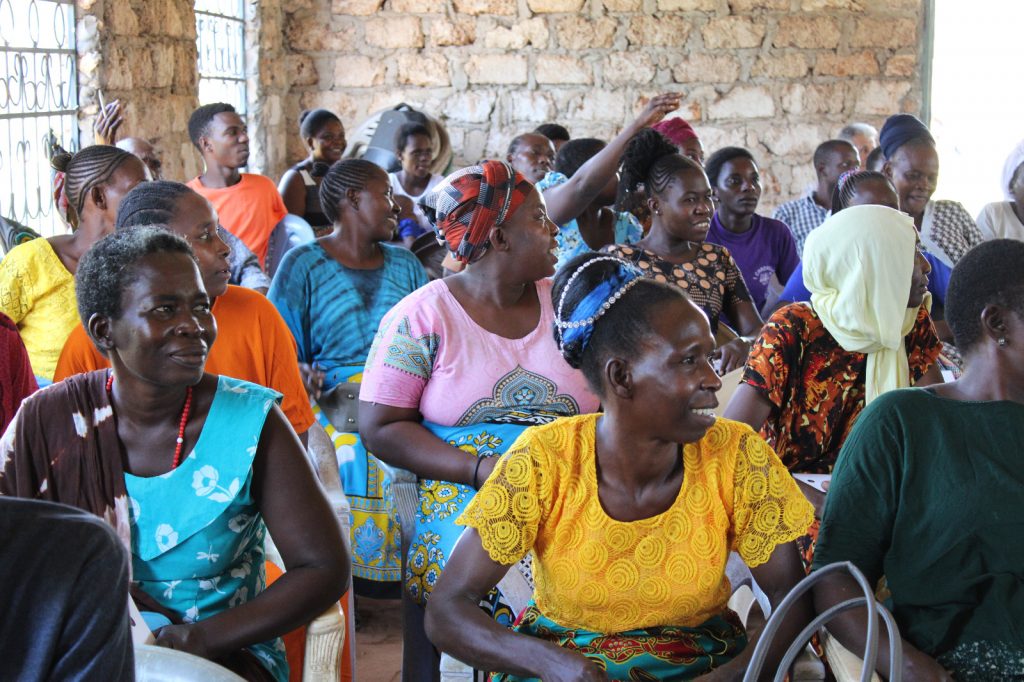
EFF Concludes Successfull Food and Income Security Project in Matsangoni County
All EFF programmes are grounded in our core principles of integrity, respect, agility, excellence and accountability. These values are what first attracted the Innocent Foundation UK to partner with us in 2022, when they came across our work in the cashew sector in an article on Devex written by Anthony Langat. With their funding, EFF Kenya was able to design and pilot an agroforestry model amongst smallholder farmers in a ward of Kilifi County called Matsangoni. The project, which concluded in June 2025, was instrumental in establishing EFF’s footprint as a trusted development partner for both farmers and funders alike. Today, EFF has reached 130,000 trees planted, with 3,500 farmers in Matsangoni ward, and made a difference in the community’s food security.
Most importantly, it created a foundation for scaling: in February 2024, EFF launched the Tukuze Kilifi Project, expanding this agroforestry project to 25,000 farmers across 14 wards, with over 2 million seedlings distributed.
Building Resilience in Matsangoni
This project was implemented between 2022 and 2025 with the goal to improve the household income and health of 3,500 smallholder farmers and their families. We did this by intercropping cashew trees with finger millet, where one is a lucrative cash crop and the later a nutritive plant for household consumption.
At the heart of the project was the introduction of high-yielding variety (HYV) cashew trees from Tanzania, expected to produce a minimum of 20 kilograms of nuts per tree per year from the sixth year onward. This was the first time Tanzanian cashew, known in global markets for its superior nut size and quality, was being propagated and planted at scale in Kenya. During the 2022 planting season, EFF brought in 100 kgs of seeds and planted 4500 trees as a test. The trees took root well in their environments. The following year, in 2023, EFF sourced an additional 2.7 metric tonnes of polyclonal cashew seeds from Naliendele, Tanzania, through TARI (Tanzania Agricultural Research Institute) ensuring high-quality planting material.
These seeds were propagated on ten nurseries established on land provided by local communities, each with the capacity to raise 12,000 seedlings. Managed by 20 trained nursery operators, our nurseries became community hubs of learning, sensitization, and seedling production. Within five months, the nurseries had propagated tens of thousands of cashew seedlings, all certified by the Kenya Plant Health Inspection Service (KEPHIS). It was important to us to clear the importing of these HYV seeds with the Tanzanian and Kenyan authorities to ensure this project was carried out with integrity, trust, and confidence.
By the end of 2023, 99,990 seedlings had been distributed to 3,518 farmers and two schools. Through a monitoring & evaluation exercise conducted in the following years, we saw that our farmers achieved an 80% survival rate. In the 2024–2025 season, a further 30,000 seedlings were distributed to replace losses. The survival rate reflects resilience despite weather and farming challenges, as these years saw scanty rainfall and drought like conditions.
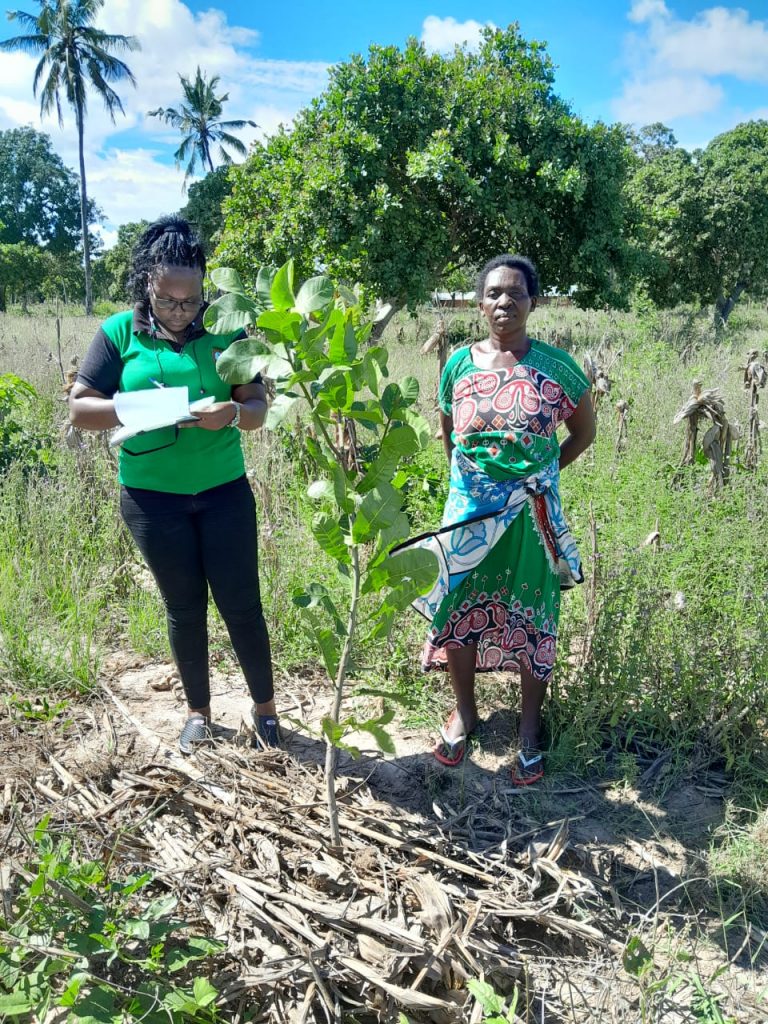
Building Farmer Knowledge
The project was built on a lead-farmer system where we identified the most capable farmers to cascade down information to small farmer groups of 25-30 members. We later switched to a more effective direct training method where seven Field Extension Officers (FEOs) oversaw 111 farmer groups. Our FEOs went from farm to farm on their motorbikes and developed strong relationships with the farmer communities in Matsangoni Ward. Apart from conducting hands on training at the farmers’ fields, FEOs also showed practical skills in the 150 demonstration plots EFF set up across Matsangoni. These were stocked with 4,500 cashew seeds,and we were able to show how best to prepare the soil, plant the seedling, and care for the plant. 3,500 handbooks on Good Agricultural Practices (GAP) for cashew were distributed.
Training covered land preparation and planting to advanced tree management: mulching, pruning, staking, de-suckering, and organic pest control methods. Farmers also learned to protect young trees from livestock and integrate organic manure into their soils. 100% of surveyed farmers reported that the trainings were helpful, boosting both their knowledge and confidence.
Strengthening Farmer Organization
Recognizing the power of a collective to create lasting change, EFF Kenya supported the formation of the Mibibo Farmers’ Cooperative, which formally registered in October 2022. Mibibo were the first cooperative of their kind in Kilifi County and are still active today.
The cooperative received mentorship from the Kilifi County Department of Cooperatives and a three-day leadership training from the Emerging Leaders Organization, fully sponsored by Innocent Drinks UK. Peer-to-peer learning was also facilitated through a successful tea cooperative in Kericho County, while international partners helped develop a five-year business plan.
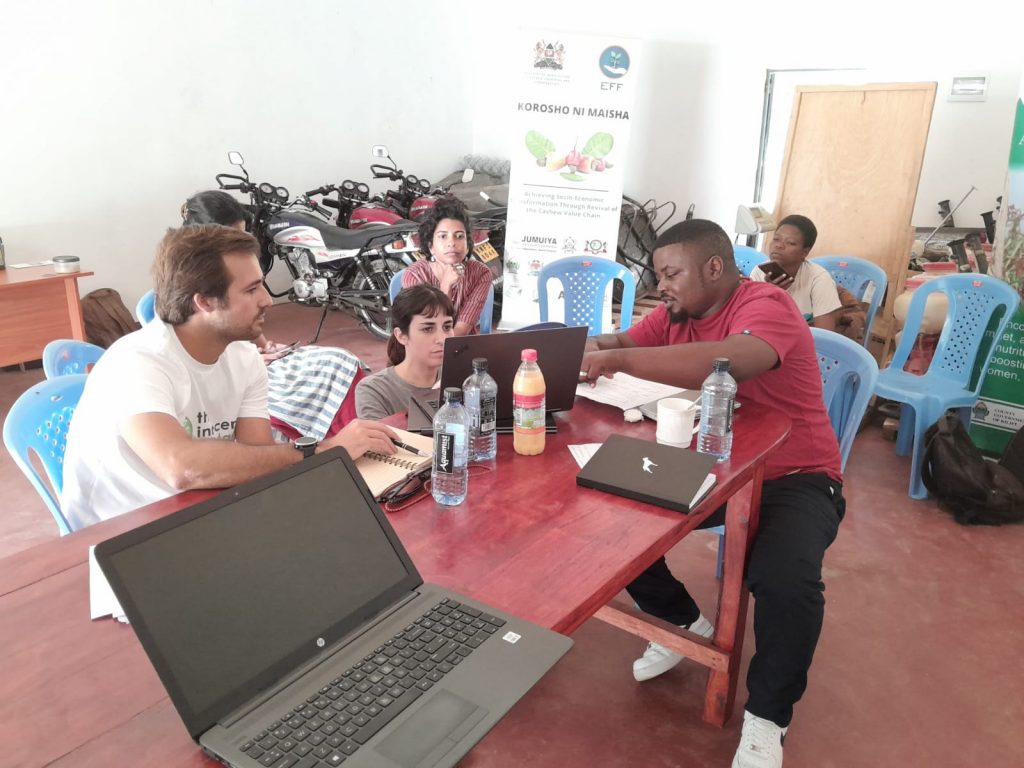
The Innocent scholars in the Matsangoni office with country coordinator Mathew Jilani
Two scholars from Innocent Foundation visited our office in Matsangoni from 13th to 27th August 2023 to develop a business plan for the Mibibo through to 2028. In the first week of their visit, they visited different stakeholders that are linked to the off-taking of raw cashew nuts, including farmers, aggregators, and processors. These are the people who make up the cashew value chain. This gave them a broad understanding of the business and helped them come up with a business plan which they presented to the cooperative’s leadership. Watch their vlog on their efforts here.
Another organisation the Matsangoni project was able to launch is the Chumatsaro Youth Group. Focused on rural youth employment, this group received 10 modern beehives, with potential to earn KES 300,000 annually from honey sales. The beehives also enhance cashew pollination. The 25 members of the group harvest honey every three months and can produce 320 litres of honey every year. The group has bottled and branded their produce and placed it on market shelves in Kilifi County, selling for KES 1,000/kg ($ 7.75).
Another organisation the Matsangoni project was able to launch is the Chumatsaro Youth Group. Focused on rural youth employment, this group received 10 modern beehives, with potential to earn KES 300,000 annually from honey sales. The beehives also enhance cashew pollination. The 25 members of the group harvest honey every three months and can produce 320 litres of honey every year. The group has bottled and branded their produce and placed it on market shelves in Kilifi County, selling for KES 1,000/kg ($ 7.75).
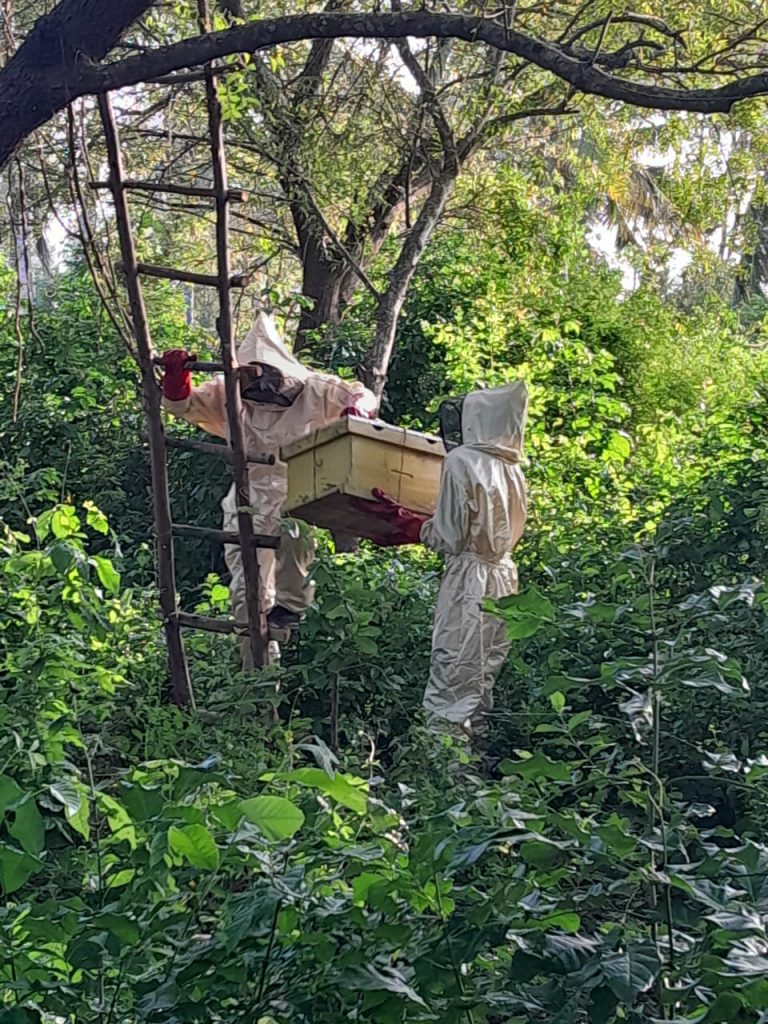
Honey harvesting in Matsangoni ward.
Finger Millet for Nutrition
For EFF and for the Innocent Foundation, the nutrition security arm of this project was crucial. Alongside cashew, the project aimed to re-introduced finger millet, a crop that is indigenous to this region but forgotten, as a climate-resilient, nutritious staple crop. As a staple carbohydrate, finger millet provides more calcium, protein and iron than maize, the current common carb in the local diet. This makes it an ideal food for growing children, pregnant women and young mothers.We worked to promote finger millet so people could benefit from this hardy, nutrient-rich, indigenous plant. A nine-month awareness campaign designed by EFF Kenya and rolled out with the support of the Kilifi North Sub-County Nutrition Officer reached large audience through radio shows, murals, community health volunteers, and village barazas.
EFF created a jingle that celebrates finger millet (wimbi) to raise awareness. Cooking demonstrations by our expert nutritionists showcased finger millet in everyday recipes, like porridge, chapati, mandazi, and even doughnuts. 33 schools were reached through awareness camps, engaging 6,400 children. EFF also held sessions with would-be mothers and young mothers to explain to them the benefits of finger millet in their diets.
By the project’s end, 99% of surveyed households reported consuming finger millet porridge daily, and 100% of respondents planned to continue growing the crop in future seasons. Farmers began to use seeds from previous seasons to replant finger millet, a sure sign of adoption.
Community Nutrition and Health Gains
The nutrition interventions produced measurable improvements. A baseline survey conducted in May 2023 revealed high levels of child malnutrition, with wasting at 34.8%, stunting at 39.13%, and underweight at 37.13%. By November 2023, follow-up surveys showed dramatic declines: wasting dropped to 19.53%, stunting to 20.39%, and underweight children to just 9.02%.
Supporting Systems
EFF also invested in complementary activities:
Kitchen gardens: 220 farmers were trained in kitchen gardening, using greywater to grow vegetables year-round and improve household diets.
Soil health: over 300 soil samples tested revealed nutrient deficiencies. 14 vermicompost structures were built, empowering farmers to adopt organic soil fertility practices. These were placed at locations that were accessible to several farmers in an area.
Water harvesting: Two reservoirs were constructed in Mkongani ward. About 5 meters on both sides and 2 meters deep, these ponds harvest rainwater and provide nearby farmers with a source of irrigation in dry months.
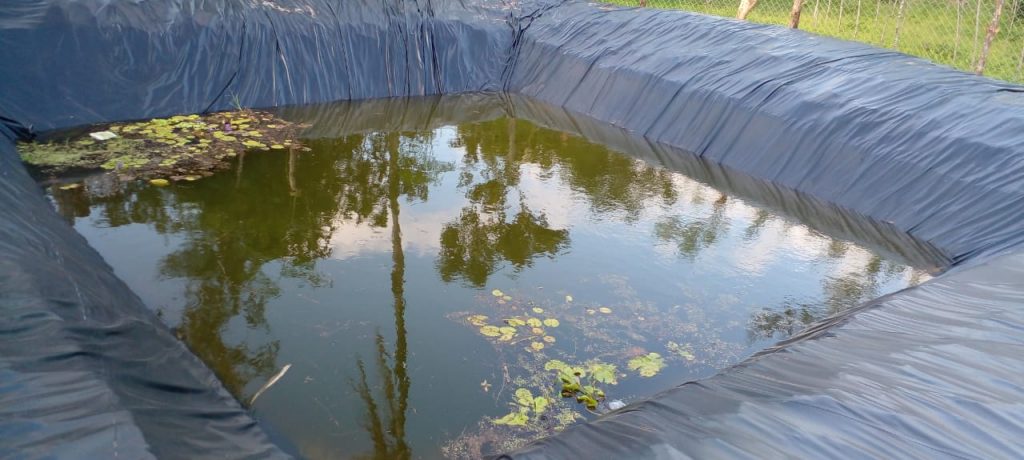
A water harvesting pond. This pond was constructed with support from the community and continues to serve them in return.
A Lasting Legacy
The success of EFF’s interventions in Matsangoni laid the foundation for securing a new grant from carbon asset developer, ETG Climate Solutions, leading to the launch of the Tukuze Kilifi Project, a large-scale, climate-smart agroforestry initiative. Officially launched in February 2024, the project builds on EFF’s proven cashew restoration model, scaling it into an integrated programme across Kilifi County. What began as a targeted intervention in one ward with 3,500 farmers has now expanded to 25,000 farmers across 14 wards.
In Matsangoni, our initial goal was to plant 100,000 cashew trees. Under Tukuze Kilifi, this has grown exponentially, with over 2 million cashew and moringa seedlings planted by participating farmers. In addition, finger millet seeds have also been distributed to 12,500 farmers, 16 water ponds and 50 vermicompost structures have been constructed.
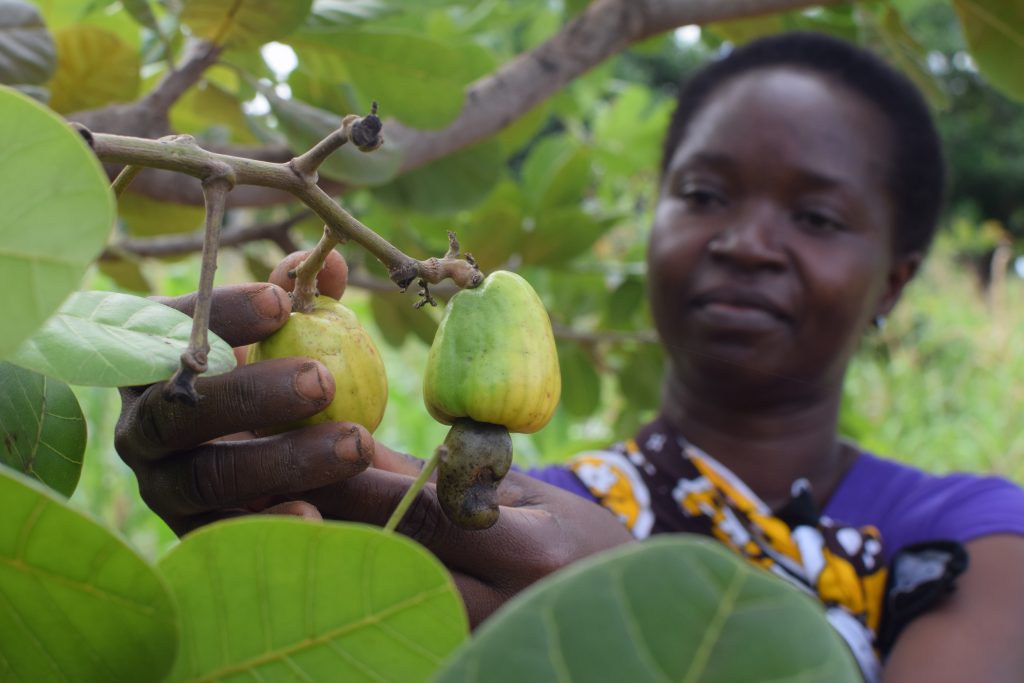
Gemima, a farmer in Matsangoni picks a cashew fruit off a maturing tree. Over the coming years, EFF will be able to support farmers like her who were part of the Matsangoni Agroforestry and Food Security Project through the new Tukuze Kilifi Agroforestry Project.
Conclusion
This project began with the goal to improve the lives of 3,300 smallholder farmers in Matsangoni, but as is the nature of impact-driven agriculture initiatives, it blossomed into something more. The Matsangoni Agroforestry Project is a model of sustainable agroforestry, and also a model on how to develop with integrity and respect in East Africa. With cashew trees offering long-term income, finger millet improving daily nutrition, and cooperatives like Mibibo laying the groundwork for farmer market access, Matsangoni is now a farmer community that is on the path to becoming food and income secure.
